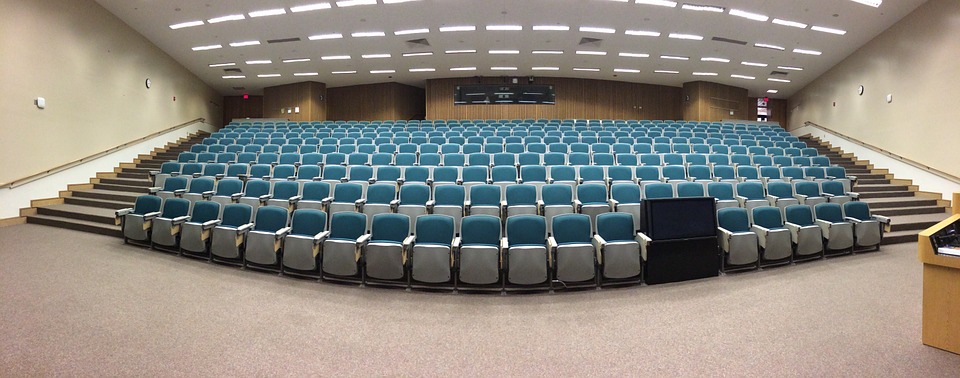Image Description: An empty university auditorium.
Universities will never look the same again after this pandemic. With revenue losses expected of up to $19 billion over the next three years, a massive restructure of the sector is already underway.
What this restructure means is undetermined. If the Liberals and Vice Chancellors get their way, students and staff will bear the burden of that revenue loss through job cuts. Universities Australia predicts up to twenty-one thousand job losses; cuts to courses and majors; and higher costs for students. This is a terrible deal for us. We can and should demand better: no cuts, and fully-funded higher education.
Looking at the way in which universities in the Eastern states have started undertaking this restructure can give us a sign of what is to come at UWA. The University of Sydney, which is expecting a budget shortfall of $470 million this year, has announced it will cut 30% of its arts courses. Charles Sturt University and University of Tasmania are planning to cut 75% of their available courses. We should expect similar cuts here at UWA.
UWA has already made significant cuts to the arts in the last few years, particularly when it discontinued Gender Studies, European Studies and Medieval History majors in 2016. This was an attempt to make universities more profitable, and gut courses that are not useful to increasing the profitability of key sectors of the WA economy, such as mining.
Other cuts on the table are those to the conditions and jobs of staff. According to The Conversation, universities have effectively been ruled out of the JobKeeper Scheme, since employees must be employed continuously for twelve months at a business that has lost between 30-50% of its revenue to be eligible. The high rates of casualisation at Australian universities means many staff members work short-term contracts, and therefore cannot apply.
Instead, staff members are finding themselves in the dole queue without a single day’s notice. RMIT and La Trobe, at which casuals and fixed-term staff make up 60-70% of employees, have sacked hundreds of casuals, with additional pay cuts of 5-20% proposed for permanent staff. UWA is likely to follow suit, since it is facing a revenue decline of 24%, according the Vice-Chancellor Jane den Hollander on the UWA University News website.
Den Hollander has already made it clear that she thinks it is the staff members who should have to pay for this loss at her multi-billion-dollar institution. In an email to staff on 22 April she stated “the significant and deep changes required to endure the prolonged impact of the virus on the University and our community more generally will be down to us – the staff who are the University…” The use of the term ‘us’ is deeply cynical, considering den Hollander received a $1.1 million salary in 2018 in her role as VC of Deakin University, according to the Times Higher Education website.
In the same email she announced a pause to external recruitment, and is pressuring staff members to immediately take their annual and long service leave. She also flagged the possibility of a 10% salary reduction.
Making students and staff pay for the economic crisis is consistent with the bipartisan project of privatising higher education over the past four decades, and running universities like businesses. It is time not only to fight back against these current reforms, but also to change the neoliberal model of the university sector. University should be free; courses should be government funded; corporations should be kicked off of campus; and welfare payments should be above the poverty line. This fight back has already begun, with a significant minority of National Tertiary Education Union (NTEU) members across the country voting to reject the proposed cuts.
A campaign group on Facebook for students called ‘Students Organising Resistance in the Pandemic’ has been set up to organise solidarity with our staff members. Undoing decades of cuts to higher education is not going to be easy, and is going to take an ongoing movement of strikes and protests. But it is possible, and if we are to save our universities from total devastation, we must get organised now.
Image courtesy of Pixabay

